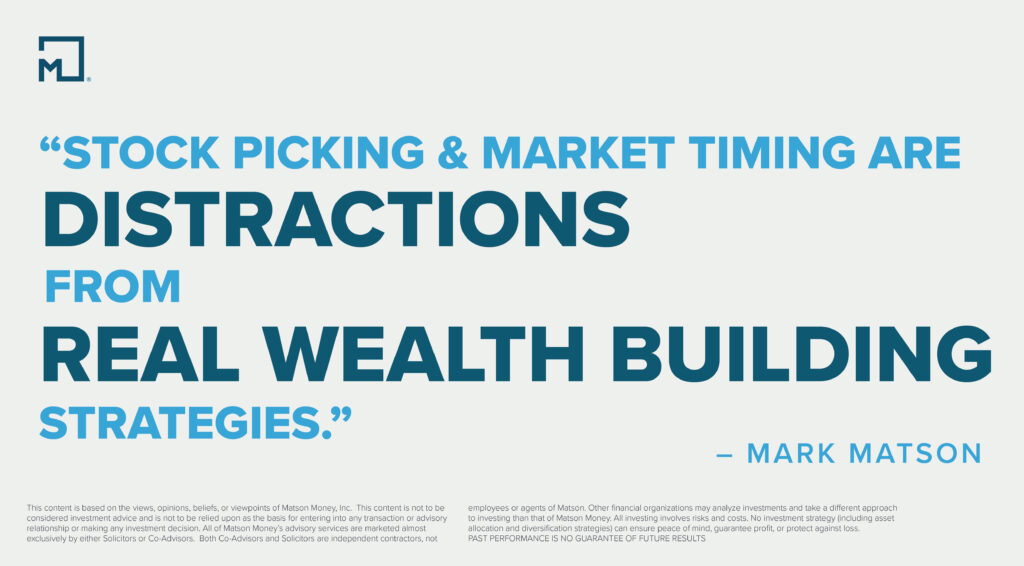
In an age where investing has often been gamified and stripped down to tapping an app, the temptation to pick individual stocks is more present than ever – especially for those being prompted with the idea of having found the next big thing. But beneath the headlines and hype lies a sobering and potentially financially destructive truth: stock picking is not just risky – it’s dangerous to an investor’s financial future.
Why Stock Picking isn’t a Game
While the overall trajectory of the stock market has historically trended upward, any individual stock carries the potential to collapse, dragging down your portfolio with it.1 Consider the case of Peloton and Zoom. At the peak of the pandemic, they were darlings of the market. Peloton traded around $50 in 2020 and Zoom soared to $243.1 But by January 2024, Peloton had plummeted to under $7, and Zoom could be picked up for just $68.¹
These are not isolated stories – they are all-too-familiar warnings.
Investors often assume that they possess the insight or intuition to pick so-called winners. But even Warren Buffett, an often celebrated investor and active fund manager, admitted that in 58 years of managing Berkshire Hathaway, only about a dozen decisions made a meaningful difference.2 That’s roughly one good call every five years—made by one of the so-called best.2 “Most of my capital-allocation decisions have been no better than so-so,” Buffett said, noting that some of his biggest supposed wins required “very large doses of luck.”²
Why Investors Often Fail
Stock picking can be seductive and provide a thrill that some investors are seeking. The media glamorizes it, social platforms hype it, and people love to share stories of the one stock that skyrocketed. But a brutal reality is this: investors will most likely fail at consistently picking so-called winners. Why?
Because markets are complex, information is vast and ever-changing, and the future is unknowable. Even mutual fund managers—professionals with research teams and millions or billions under management—can’t beat the market consistently. As American economist Burton Malkiel noted in A Random Walk Down Wall Street, “The past records of mutual fund managers are essentially worthless in predicting future success.”³
And when it comes to timing the market, Charles D. Ellis, American Investment Consultant, found the evidence “overwhelmingly negative.”⁴ Market timing and stock picking aren’t strategies – they’re gambles.
Today’s Concentration Crisis: The “Magnificent 7”
Today, more than 30% of the S&P 500’s weight is concentrated in just seven companies: Microsoft, Meta, Alphabet (Google), Apple, Nvidia, Amazon, and Tesla.⁵ Known as the “Magnificent 7,” these tech giants dominate headlines and portfolios alike. But with such concentration comes potential risk. Will these companies continue to thrive? Maybe. Will they stumble? History suggests it’s not only possible – it’s probable.
Think back to the dot-com bubble. Everyone thought the tech titans of the early 2000s were untouchable—until they weren’t.6
A Smarter Path: Globally Diversified, Scientifically Grounded
So, what’s the alternative? Investors don’t have to roll the dice. There is a prudent, empirically tested path forward: a globally diversified portfolio based on Modern Portfolio Theory, Efficient Market Hypothesis and the Three-Factor Model.
Modern Portfolio Theory (MPT) emphasizes the importance of diversification – not just across industries or countries, but across asset classes. The Three-Factor Model, developed by Kenneth French and Nobel laureate Eugene Fama, adds depth by identifying how a portfolio’s exposure to three simple but diverse risk premium factors determine a majority of investment results: the market factor, the size effect, and the value effect.
This isn’t just theory; It’s investing science—rigorously tested and designed to maximize expected returns while minimizing risk.
Education is Power
At Matson Money, we believe that education is the cornerstone of prudent investing. That’s why we created the American Dream Experience®—a powerful, two-day event that helps investors discover Nobel Prize-winning academic investing principles.
This isn’t just about learning what you’re doing with your money. It’s about understanding why—so you can build a life of purpose and confidence, in contrast to the anxiety and chaos that plague many investors.
Stock picking may seem exciting. It may feel smart. But in reality, it can be a dangerous distraction from what can create long-term wealth: a disciplined long-term investing strategy.
DISCLOSURES:
This content is based on the views, opinions, beliefs, or viewpoints of Matson Money, Inc. This content is not to be considered investment advice and is not to be relied upon as the basis for entering into any transaction or advisory relationship or making any investment decision.
All of Matson Money’s advisory services are marketed almost exclusively by either Solicitors or Co-Advisors. Both Co-Advisors and Solicitors are independent contractors, not employees or agents of Matson.
Other financial organizations may analyze investments and take a different approach to investing than that of Matson Money. All investing involves risks and costs. No investment strategy (including asset allocation and diversification strategies) can ensure peace of mind, guarantee profit, or protect against loss.
PAST PERFORMANCE IS NO GUARANTEE OF FUTURE RESULTS
The Nobel Memorial Prize in Economic Sciences, commonly referred to as the Nobel Prize in Economics, is an award for outstanding contributions to the field of economics, and generally regarded as the most prestigious award for that field.
Markowitz, Harry. “Portfolio Selection.” Journal of Finance. 1952.
Harry Max Markowitz is an American economist, and a recipient of the 1989 John von Neumann Theory Prize and the 1990 Nobel Memorial Prize in Economic Sciences. Markowitz is a professor of finance at the Rady School of Management at the University of California, San Diego.
Efficient Market Hypothesis, first explained by Dr. Eugene Fama in his 1965 doctoral thesis.
Eugene F. Fama, “Random Walks in Stock Market Prices,” Financial Analysts Journal, September/October 1965.
Eugene F. Fama, 2013 Nobel laureate in Economic Sciences; is widely recognized as the “father of modern finance.” His research is well known in both the academic and investment communities. He is strongly identified with research on markets, particularly the Efficient Market Hypothesis.
Three Factor Model
Fama, Eugene F. and Kenneth R. French. “The Cross-Section of Expected Stock Returns,” Journal of Finance, 47, June 1992.
Efficient Market Hypothesis
Eugene F. Fama, “Random Walks in Stock Market Prices,” Financial Analysts Journal, September/October 1965.
Modern Portfolio Theory
Markowitz, Harry. Portfolio Selection: Efficient Diversification of Investments. New York. Wiley. 1959. Print.
Sources
- Ermey, Ryan. Why Picking Stocks is a Terrible Idea for Young Investors. CNBC. Published January 9, 2024. Retrieved 31 March 2025 from https://www.cnbc.com/2024/01/09/why-picking-stocks-is-a-terrible-idea-for-young-investors.html#:~:text=The%20risks%20are%20too%20great%20with%20individual%20stocks&text=%22They%20often%20don’t%20know,need%20to%20make%20good%20decisions.%22.
- Noonan, Danny. Even Warren Buffett Thinks Stock Picking is Hard. Morningstar. Published April 26, 2023. Retrieved 31 March 2025 from https://www.morningstar.com/stocks/even-warren-buffett-thinks-stock-picking-is-hard.
- Malkiel, Burton. A Random Walk Down Wall Street, 2003, p. 374
- Ellis, Charles D. Investment Policy: How to Win the Loser’s Game, 1993
- Voronoi. Magnificent Seven Lose Ground as Broader S&P 500 Edges Up. Retrieved 31 March 2025 from https://www.voronoiapp.com/markets/-Magnificent-Sevens-Market-Capitalization-Share-of-SP-500-Rises-from-281-to-337-in-2024-3175.
- Hayes, Adam. Dotcom Bubble Definition. Investopedia. Published May 31, 2024. Retrieved 31 March, 2025 from https://www.investopedia.com/terms/d/dotcom-bubble.asp.




